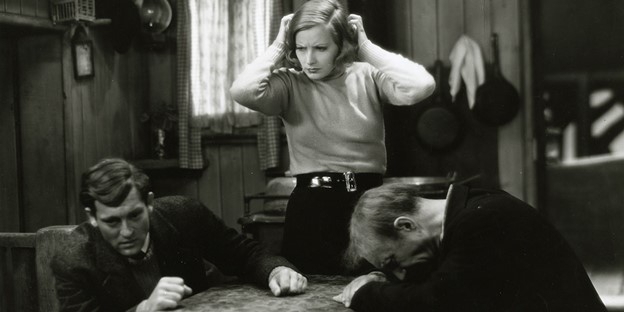Anna Christie (1930)
Clarence Brown's "Anna Christie"
By 1930, Greta Garbo had been the star of the silent film screen for several years. However, with the advent of the talking picture, MGM was reluctant to let its star be heard in a talking role. They were unsure what the public response would be, as the image people had created of Garbo in their minds might very well be shattered once they heard her actual voice. In order to make the transition, they needed the right film and the right director. They chose Clarence Brown to adapt a 1921 play by Eugene O'Neil called "Anna Christie."
"Anna Christie" begins with an alcoholic sailor learning that his daughter is coming to see him after he abandoned her fifteen years prior. His daughter, Anna, arrives hiding a dishonorable past. This past involves working in a brothel and being raped. Anna stays with her father on his barge. One day, they rescue a sailor displaced at sea. Anna and the sailor, Matt, fall in love. After he proposes, she is uncertain of whether he will tolerate her dark past. She then opens up to both her father and Matt, who take the news hard. They must reconcile with this newfound understanding of Anna and eventually they move past it.
Because this was the first 'talking film' of Garbo's career, it was marketed under the tagline, "Garbo talks!" The hope is that this marketing would entice audiences to flock to their cinema to hear Hollywood's biggest star speak for the first time. Audiences were surprised to learn that Garbo's voice was not what they expected it would be. Because Garbo was born and raised in Sweden, as well as spending the first part of her adult life in Germany, Garbo had a very 'European' accent. On top of this, her voice was a lot lower register than many imagined.
The expectations of Garbo versus the reality of her speaking voice actually play into the themes of the film quite nicely. In the film, after Anna's father, Chris, learns that she will be arriving, he spends the first quarter of the film riddled with expectations regarding the daughter he hasn't seen in fifteen years. This runs parallel to the audience's excited expectation of hearing Garbo. After Anna arrives, she confides in a tramp named Marthy about her dark past. The viewer knows this information will transform the perception that her father has of her. In a similar way, Garbo's speaking voice transformed the way audiences perceived her. Later in the film, Matt falls in love with Anna. He becomes very controlling over her, as he chastises her for knowing a tramp and even gets conflicted about her religious affiliations. Once he discovers her dark past, his perceptions of her change dramatically. This leads to the main thematic crux of the film. Anna is a woman who has been manipulated, abused, and abandoned by men her entire life. These men put Anna in a conceptual box of their own design. Once it becomes clear that Anna does not fit nicely into their preconceived box, they take it out on her. Anna must continue to deal with men's perceptions of her. Any behavior or knowledge of her outside of the scope of what they expect creates conflict. This is exactly what the audience does to her as well. Many audience members expected Greta Garbo to sound a certain way, a way in which they had only imagined in their minds. Once they discover that Garbo did not sound the way they expected, many were let down and unhappy. It seems as though the film is actively criticizing not only your warped expectations of Greta Garbo but your warped expectations for women in general.
"Anna Christie" did well both critically and financially. The film grossed around $1.5 million, making a profit of $576,000. Many critics hailed Garbo's performance as masterful, and she even was nominated for an Academy Award. Other critics failed to recognize the point of the film. For example, John Mosher of "The New Yorker" claimed that it was "impossible that a woman so markedly beautiful should have such an extraordinarily difficult time." Once again, this viewer is projecting his expectations and assumptions about the life of a woman, believing that beautiful women cannot have a hard life. This critic missed the point of the film - he should not make assumptions about women and their lives. Because the film went outside of the abstract box he created in his mind, he was unhappy. So, take some advice from 1930's "Anna Christie" and stop putting the women you see around you in a prison of your own expectations, because there is so much more to them than what's in your limited viewpoint.




Comments
Post a Comment